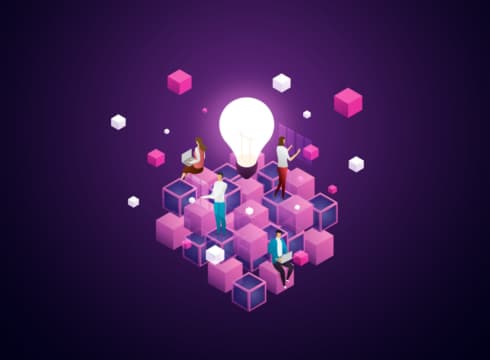The tech stack is designed to offer blockchain-as-a-service and encompasses a geographically distributed infrastructure designed to support various “permissioned” apps
MeitY also unveiled a blockchain sandbox platform called NBFLite, the National Blockchain Portal and Praamaanik, a blockchain-enabled solution for verifying mobile apps
Going forward, MeitY has set its eyes on developing an “extensible blockchain framework” to address challenges such as skilled manpower, vendor lock-in and other research challenges
Inc42 Daily Brief
Stay Ahead With Daily News & Analysis on India’s Tech & Startup Economy
India has been experimenting with blockchain for quite some now. As part of its broader trysts with the emerging technology, the Ministry of Electronics and Information Technology (MeitY) has now launched a slew of blockchain-based solutions to foster security, trust and transparency of various citizen centric applications.
In continuation with this, the Ministry on September 4 unveiled the “Vishvasya”, the national blockchain technology stack designed to offer blockchain-as-a-service (BaaS). The new platform encompasses a geographically distributed infrastructure designed to support various “permissioned” blockchain-based applications.
Additionally, the government also unveiled a blockchain sandbox platform called NBFLite, the National Blockchain Portal and Praamaanik, a blockchain-enabled solution for verifying mobile app origins.
Speaking at the launch event, MeitY additional secretary Bhuvnesh Kumar underlined that the technology could potentially “transform” governance in India by making public services more transparent, efficient, and accountable. He also called on various state governments and departments to scale up applications on the National Blockchain Framework (NBF).
But, what is blockchain? Simply put, it is a type of digital ledger technology that uses cryptography and algorithms to create a chain of blocks that record transactions. Owing to its benefits such as transparency, security and immutability, these ledgers can record transactions and data that cannot be easily tampered with and can be verified in future.
That said, let’s dive deeper into the Centre’s ambitious blockchain technology stack.
What Is The National Blockchain Technology Stack?
The new tech stack has been envisaged with fostering trust by developing new types of distributed software architectures.
The BaaS model provides security assurance of various blockchain components, reduces the need for human intervention and enables “technological support” to various stakeholders building and deploying blockchain apps.
With this, the government is looking to ease the adoption of blockchain among various stakeholders including infrastructure providers, smart contract developers and app developers.
For the uninitiated, blockchain infrastructure providers manage blockchain apps for businesses and offer services such as node operation, decentralised storage, among others. Meanwhile, smart contract developers create, deploy, and maintain smart contracts on DLT platforms.
Smart contracts are self-executing agreements that are encoded on a blockchain platform and are automatically executed when certain conditions are met.
For infrastructure providers, the BaaS stack offers network setup wizard as well as single and multi-node setups while smart contract developers can avail features such as smart contract studio with pre-populated templates and design patterns for various application domains.
Additionally, the BaaS service also offers generic REST APIs (representational state transfer application programming interface) to access smart contract functions and easy integration with mobile apps and loT devices.
Features Of Vishvasya BaaS:
- Rapid end-to-end “permissioned” blockchain app development and deployment
- Ready to use security audited blockchain containers for production setup
- Blockchain-specific security audit guidelines in place
- Geographically distributed infrastructure spanning three data centres in Hyderabad, Pune and Bhubaneswar
Another key feature of Vishvasya blockchain tech stack is NBF Lite, a blockchain sandbox platform that has been developed specifically for startups and academic institutions for rapid prototyping of applications, carrying out research and capacity building.
NBF Lite has been developed as part of a joint collaboration between C-DAC, NIC, IDRBT Hyderabad, IIT Hyderabad, IIIT Hyderabad and SETS Chennai, with support from MeitY.
Meanwhile, MeitY said that a slew of blockchain-based solutions have either been already developed or are being built in association with various government agencies.
It has partnered with the likes of Cotton Corporation of India, Forensic Science Laboratory, CBSE and Ministry of Justice to build use cases such as cotton bale identification and tracking, document chain and applications for various exams.
MeitY is also working with governments of Karnataka, Chhattisgarh, Assam, Jammu and Kashmir, among others to build and deploy blockchain-based apps.
Building A Blockchain Ecosystem
At the launch event, MeitY officials also unveiled “Praamaanik”, a blockchain-based solution to verify mobile apps.
“Praamaanik is a solution that harnesses blockchain technology to verify mobile app origins and is powered by the NBF. The mobile apps are uploaded by (a) designated representative of the organisation and the unique details of the mobile app are recorded in the blockchain ledger,” said a statement.
The blockchain-enabled solution offers “immutable ledger of mobile app fingerprints”, authenticate apps, foster trust and other features.
Alongside, the Ministry also debuted the National Blockchain Portal that will offer a one-stop-solution for all things related to the National Blockchain Framework. The portal will offer training, data related to allied startups, an integrated chatbot news and all related publications in one place.
Going forward, MeitY has set its eyes on developing an “extensible blockchain framework” to address challenges such as skilled manpower, vendor lock-in and research challenges related to security, interoperability, performance and other aspects.
{{#name}}{{name}}{{/name}}{{^name}}-{{/name}}
{{#description}}{{description}}...{{/description}}{{^description}}-{{/description}}
Note: We at Inc42 take our ethics very seriously. More information about it can be found here.


